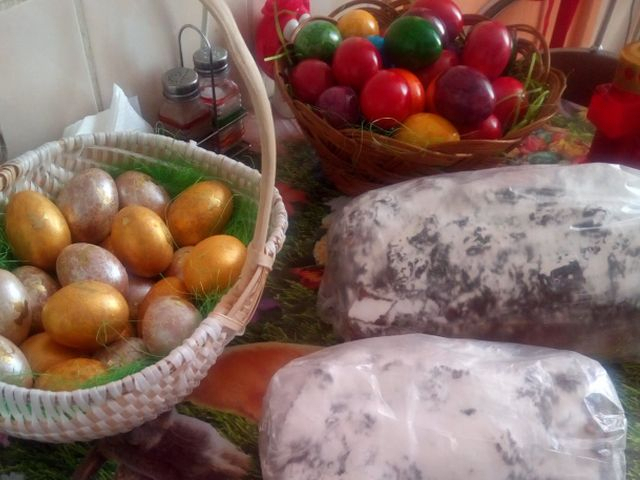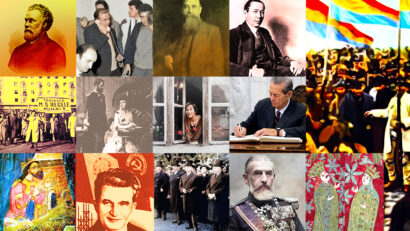Memories of Easter Between the Wars
Easter was a magical time in the countryside between the wars

Steliu Lambru, 27.04.2020, 14:56
History is not just major, special moments, that stand out, but also pays attention to repetitive, everyday life, to habits, customs, and perceptions. Recent history has the advantage of bringing back to collective memory moments and customs lived by people who can still talk about them in person. Such a moment is Easter as it was celebrated in Romania between the wars, a time of maximum freedom and prosperity, which many people recall hearing about from people of the previous generation. Radio Romanias Oral History Center preserves the testimonies and memories of such people, who say that it was celebrated in a patriarchal and tranquil atmosphere.
This is remembered by physician, teacher, poet, and translator Constantin Dimoftache Zeletin about Easter during his childhood, ministered over by his father, the priest of the village of Burdusaci, in Tecuci County, in Eastern Romania: “Easter was a sort of hyper-holiday for us, but we werent trembling when it got close. Father was a great absence, if we are to be fair, because of the rituals around Easter. The cluster of villages was very big, with many spread over hills, beyond forests, and he went to every house, rain or mud, talked to everyone, tended to the holy mysteries. In a way, for those people, in huts and houses spread over kilometers, that was a pre-Easter, if you will. Father, who was an extremely correct man, took a lot of time for this side of his activities, and when he got home he just collapsed with fatigue.”
Roles and tasks were doled out around Easter, but people liked to carry them out together. Such was the making of the Easter cake, to which all members of the family contributed, according to Constantin Dimoftache Zeletin: “Making the Easter cake was show, a ritual. Mother always made them when father was free, if you could say he was ever free. We hat a big vat, and made 20 kg of cakes. Mother, as the priests wife, had many visitors on Easter. She made homemade Easter cake with lots of butter, from our own cows, of course. Two great rituals were sacrosanct, which was always fascinating for us. First of all, the quality of the cake lies in the kneading, first and foremost. Not anyone can knead Easter cake. Father was Herculean, was athletic, he grabbed the dough, lifted it to the ceiling, and slammed it down, over and over again. Mother poured the melted butter, and this is how they kneaded the dough. Secondly, what impressed me at that moment of making the cakes, was mothers notion that the cakes catch a cold like a person in a bathroom. You cant open the door, it had to be hot, the temperature constant, you couldnt lift the towel covering them. That is why they rose so beautifully and got nice and round.”
As custom dictates, the apex of the holiday was going to church, and Constantin Dimoftache Zeletin lived to the fullest the hours spent in this meeting with God: “Easter ended on Resurrection Night. On that night, household chores were pretty much done, mother was bone tired, we were all very tired. We went to bed early, and then we got up around 11:30, the church was very close. In fact, we were awoken by the bells, which had a very particular sound. Someone, decades before, when the bell was made, had donated a lot of silver to the place where the bell was made. The more silver it has, the fuller the sound. Waking up like that for me is still associated with a sensation of a sacred chill, a sort of fear. It was a fear of mine, of stepping into the church as a child. I was quite shy. No one looked at me, everyone looked at their destiny, to their bigger thoughts, and I was just lost.”
Constantin Zeletins parents, along with the community, created the magical atmosphere of his childhood Easter, for him and other kids. In that atmosphere, the evils of the world disappeared, and only hope remained: “I looked around for my mother, seeking her gaze, as she was sitting down. She had a pew that people set aside for her, the church was chock-full of people, but one pew stood empty and had a flower on it. When mother arrived, a woman took the flower aside. First of all, she was the priests wife, then she was a teacher, and in addition she was the choir master. Mother was a pretty good musician, and had, right in that village, a choir in four voices. She changed the masses, had Tchaikovskys mass, or Mandicevskis liturgical, mother did not sing at random, repetitively, or imitating someone. I can still see her conducting, turning her head towards the altar so that father could give her a note.”
Childhood memories are the most idyllic and beautiful, even if the reality of adults is more complex. And they are the more valuable if they are about a past world of celebration, imagination, and perfection.
CC





























